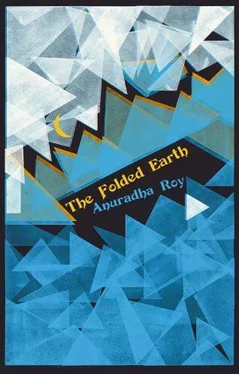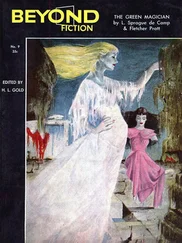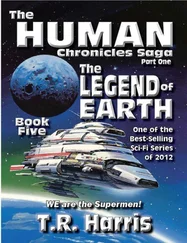The pine branch had gone out when it fell from her hand and she had lost the matches somewhere on the way down. Nothing was visible in the aftermath of the headlights. She closed her eyes to get used to the dark again and in a while discovered that the light of the half-moon and stars was enough for her to see where she was going.
She began walking towards Uprari. “Put one foot before another, and you will get there,” she told herself. “Wild animals eat dogs, not humans.” The smooth, level tarmac was a relief after her scramble through the forest. She hummed under her breath, songs from the radio at the jam factory. She changed shoulders when the bag she was carrying started to feel heavy. Her stomach began to rumble with hunger, but she put away thoughts of food, not knowing how long the rotis and jaggery would have to last. To her left, the narrow road rose into a sheer granite cliff overgrown with dry grasses and bent trees. To the right, it fell away into a valley, on the other side of which were faraway villages whose names she did not know. There was not a glimmer of light on the road. At times, cars and motorbikes charged past her, tearing the road in half with their headlights, noise, and fumes, too fast to notice anyone walking. No buses appeared.
At eight, she reached Pilkholi and sat down at the tea stall exhausted, no longer bothered that someone she knew would see her. “How much is a tea?” she asked, and was told, “Three rupees for you, four for anyone else.” She asked for a glass of water, ate a lump of her jaggery with it, and then began to walk again.
Half an hour further on towards Uprari, large headlight beams once again swept towards her. Once again she stopped and wildly waved her arms, hoping that the glare of the headlights this time hid a bus and not a truck.
It was a bus, and the conductor leaped out in fury. “What do you think you are doing? Standing in the middle of the road like a cow! Who do you think will go to jail if you get killed?”
“Where is it going?” she asked, in a voice trembling with tears.
“Wherever it is going, it’s not taking you. Mad girl! And there’s no space.”
“I can sit on the floor,” she said. “I can stand.” Her shoulders drooped from the weight of her small bag.
“Not in my bus,” the conductor said. He put a foot on the lowest step of the bus and held the handrail to haul himself in. He slammed the body of the bus twice with the flat of his palm to tell the driver to drive on. Then as the bus revved its engines, he banged the wall of the bus again.
“What the hell are you doing? Do we go or stop?” screamed the driver.
The conductor’s tone was bad-tempered and grudging, but he said, “Get in. And be quick. And pay for the ticket — no free rides on this bus.”
Charu got in. The bus was going to Nainital, two hours away. They gave her a seat right at the back, and the man next to her, at the window, retched out of it all through the journey as the bus swung round the twisting and reeling and swinging and swirling hill roads.
That first week in October, I thought I could hear the earth creaking on its tilted axis, moving a little further in the opposite direction each day, towards the cold months. Very slowly, but it did move, and the wet, grey, solid sky which had come down to live around houses and treetops through the months of rain thinned to uncover an airy concentration of blueness. Standing outside the house in the mornings, I luxuriated in the sunlight and heard nothing but the chirring of cicadas. At my feet, the meadow ended and slid away into limitless forests. Far below, the forest’s green was lit by bright points of autumnal red. Dinosaurs must have come up that slope once, crushing trees in their path, to sun themselves on the gigantic moss-greened granite boulders that were strewn over this part of the forest. The snow-peaks that ringed the horizon blazed: I could hardly raise my eyelids to let in their incandescence.
The golden light after the monsoon, the meadows pink with cosmos and wild lilies, and the clarity of the cool, dry air went through everyone like a live current. All around, people were whitewashing and painting and patching up their homes to undo the damage from the rains in time for Diwali. Mattresses were sunned after months of damp, women got down to the business of cutting grass to store for the winter months. In the bazaar, new election posters were plastered over the rain-sodden ones and new bunting went up everywhere. Road-works began, and smoking barrels of tar added their acrid stench to the scent of honeysuckle. Mr Chauhan’s men were everywhere, with cans of paint and tins of Brasso. The Reunion was a month away.
At the factory, we were in the middle of labelling the hundreds of bottles of jam we had made out of the summer fruit. This too had to be done before Diwali, so that the stock would reach Delhi in time for festival sales. The newspapers had forgotten Orissa’s Christians and moved on to something else; DivineLite T.V. had once more applied itself to saving souls. Miss Wilson had calmed down. When she once more stormed into my class to rap her cane on a table and call for silence, I knew life was back to normal. In the staffroom she told me after a particularly bad morning, “How long have you been teaching? Five years. Look at Joyce Mam. She only started three months ago and the students are like mice before her. Have you learnt to control the children at all? Is there any progress? No. Zero!” She liked to say “zero” as a mocking “Zee-row! Zed-ee-ar-oh, Zee-row!” She made a circle of her forefinger and thumb and placed it over her bespectacled eye as if she were looking at me through a monocle.
As the skies cleared, Diwan Sahib began to mend. He started asking for rum. He even wanted his Rolls Royce cigarette case beside him again. “Since I look like a Silver Ghost myself,” he explained. In a not very audible voice, interrupted by hacking coughs, he ticked off doctors and nurses, as well as me, for being too bossy. He asked for the newspaper and made me sit by him reading the oddments I knew would amuse him: that the Western Railways washed its blankets only once a month; that a Ukrainian bank robber had chosen to steal a police car for his getaway; that in Australia a pet camel had tried to mate with the woman who owned him and killed her in the attempt. His room in the hospital had turned by imperceptible degrees into an extension of the Light House. His familiar mess of bottles, books, pills and papers collected around him.
Mr Qureshi came every day, the General now and then. Himmat Singh lived there, and slept in Diwan Sahib’s room. He had made himself a home in a corner with his own mattress and blankets. Each time Diwan Sahib made a sound, Himmat Singh clambered to his feet to see what was needed; for the rest of the day he chatted with the new friends he had made, or dozed in the sun by the window. He had smuggled in a bottle of rum from which he took slugs when no-one was about; once I had caught him in the act of moving Diwan Sahib’s oxygen mask aside to give him a sip. I tried going there every day to prevent such efforts; Ama went to visit him at least twice a week and sometimes we came back together from the hospital in a jeep-taxi. Already the evenings were longer, darkness fell without warning. We would hurry back from the jeep drop-off point on Mall Road to the Light House, fearful of leopards behind every shadowed bush.
On the evening of 11 October, after we came back from the hospital, I had only just shut my door when Ama came out and shouted: “Is Charu over there?”
She was not. She was not in the cow-shed either. We searched all over the estate for her, torches and sticks in hand. “Where’s the girl? Has she fallen somewhere and broken a bone? Has a leopard mauled her?” Ama wailed. “When bad things start happening, they never stop.” She went into her rooms in confused agitation. Puran, who had been in his shed, staggered out drunk with sleep and added his shouts to ours, calling for Charu as he would for a lost cow. The clerk heard us and came out of his cottage. He looked up towards us and shouted, “What is it, Ama, why are you waking the birds again?”
Читать дальше












